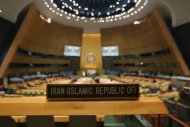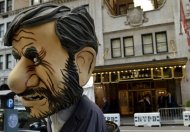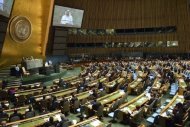Iran's
President Mahmoud Ahmadinejad is to address the UN General Assembly
Wednesday, a day after the United States vowed to stop Tehran from
getting a nuclear weapon.
Ahmadinejad's address -- his last as president -- comes after US
President Barack Obama and other Western leaders ramped up pressure on
Tehran and called for tougher international action against its longtime
ally Syria.Western leaders have accused Iran of pursuing a nuclear weapon in the guise of a civilian energy program and of ferrying weapons and supplies to aid Syrian President Bashar al-Assad's bloody crackdown on an armed uprising.
Ahmadinejad has brushed off warnings over the nuclear program since arriving in New York.
He has insisted on Iran's right to enrich uranium and dismissed talk of a US or Israeli military strike on the country's nuclear facilities.
"Uncultured Zionists that threaten the Iranian nation today are never counted and are never paid any attention in the equations of the Iranian nation," Ahmadinejad told Iranian expatriates in New York earlier this week.
In his own address to the annual UN assembly on Tuesday, Obama again warned Tehran over its nuclear program, saying an Iranian bomb would upend the balance of power in an already volatile region and threaten vital US interests.
"A nuclear-armed Iran is not a challenge that can be contained. It would threaten the elimination of Israel, the security of Gulf nations, and the stability of the global economy," Obama said.
"That is why a coalition of countries is holding the Iranian government accountable. And that is why the United States will do what we must to prevent Iran from obtaining a nuclear weapon," he declared.
US, Israeli and European delegates have skipped or walked out of previous UN speeches by Ahmadinejad -- who has predicted the demise of the Jewish state and cast doubt on both the scale of the Nazi Holocaust and the identity of the perpetrators of the September 11 attacks.
Israel is believed to be contemplating a military strike on Iran's nuclear facilities, and has pressed Obama to take a tougher stand in recent weeks, raising tensions at the height of the president's re-election campaign.
On Tuesday UN chief Ban Ki-moon expressed concern over the mounting tensions over Iran, denouncing what he called: "The shrill war talk of recent weeks."
But most of Tuesday's speeches were given over to Syria's worsening civil war, with Qatar calling for an Arab intervention against the regime and the enforcement of a no-fly zone to protect refugees.
Under pressure from his domestic rivals to show toughness after weeks of Middle East turmoil, Obama said Assad's regime "must come to an end so the suffering of the Syrian people can stop, and a new dawn can begin."
A State Department official told AFP that the United States would soon announce an increase in its aid to the Syrian rebels, but would still stop short of sending weapons and ammunition.
French President Francois Hollande meanwhile urged the United Nations to declare protected areas in "liberated zones" under opposition control in Syria so that humanitarian aid could reach refugees.
Hollande also took a tough line on Iran, accusing it of supplying weapons and men to Assad to prop up his regime and dubbing this "unacceptable."
The 18-month-old uprising -- which activists say has killed more than 29,000 people -- began with peaceful protests but has grown into an increasingly sectarian civil war.
Saudi Arabia, Qatar and Turkey have backed the mostly Sunni rebels against the Alawite-led regime, a close ally of Shiite Iran.
Six weeks ahead of the presidential election, Obama is under pressure on the foreign policy front, with criticism of his handling of the killing of US diplomats and claims he is not doing enough to support Israel.
His speech aimed to counter those claims from White House rival Mitt Romney and also renew his outreach to the Muslim world after two weeks of anti-American violence triggered by an online video that insulted Islam.
Obama said the Arab Spring would lead to a more democratic and prosperous Middle East, adding that while he condemned the film, no insults could justify violence.
He also vowed that the militants who stormed the US consulate in Benghazi on September 11, killing the American ambassador to Libya and three colleagues, would face justice.
More about the story
- West turns up heat on Iran and Syria at UN
- Obama vows before UN to halt Iran bomb
- Obama at UN calls for end to intolerance, warns Iran
- Obama vows to keep Iran from nuclear weapon
- In New York, defiant Ahmadinejad says Israel will be 'eliminated'
- Obama warns Iran on nuclear bid, containment 'no option'
- Qatar calls for Arab intervention in Syria




ไม่มีความคิดเห็น:
แสดงความคิดเห็น